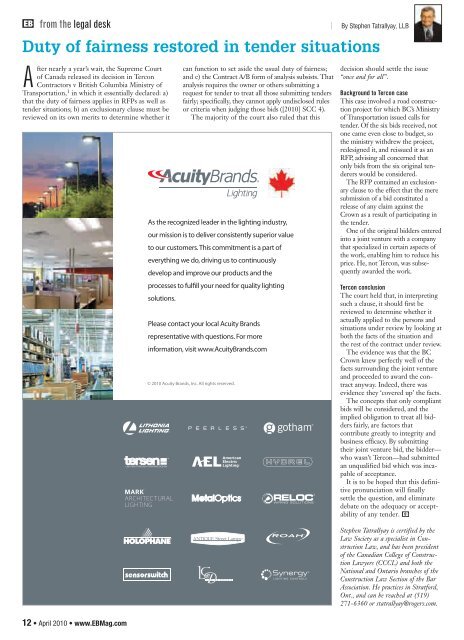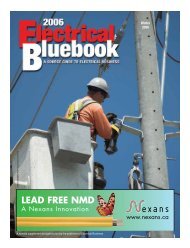Download - Electrical Business Magazine
Download - Electrical Business Magazine
Download - Electrical Business Magazine
You also want an ePaper? Increase the reach of your titles
YUMPU automatically turns print PDFs into web optimized ePapers that Google loves.
from the legal deskBy Stephen Tatrallyay, LLBDuty of fairness restored in tender situationsAfter nearly a year’s wait, the Supreme Courtof Canada released its decision in TerconContractors v British Columbia Ministry ofTransportation, 1 in which it essentially declared: a)that the duty of fairness applies in RFPs as well astender situations; b) an exclusionary clause must bereviewed on its own merits to determine whether itcan function to set aside the usual duty of fairness;and c) the Contract A/B form of analysis subsists. Thatanalysis requires the owner or others submitting arequest for tender to treat all those submitting tendersfairly; specifically, they cannot apply undisclosed rulesor criteria when judging those bids ([2010] SCC 4).The majority of the court also ruled that thisAs the recognized leader in the lighting industry,our mission is to deliver consistently superior valueto our customers. This commitment is a part ofeverything we do, driving us to continuouslydevelop and improve our products and theprocesses to fulfill your need for quality lightingsolutions.Please contact your local Acuity Brandsrepresentative with questions. For moreinformation, visit www.AcuityBrands.com© 2010 Acuity Brands, Inc. All rights reserved.decision should settle the issue“once and for all”.Background to Tercon caseThis case involved a road constructionproject for which BC’s Ministryof Transportation issued calls fortender. Of the six bids received, notone came even close to budget, sothe ministry withdrew the project,redesigned it, and reissued it as anRFP, advising all concerned thatonly bids from the six original tendererswould be considered.The RFP contained an exclusionaryclause to the effect that the meresubmission of a bid constituted arelease of any claim against theCrown as a result of participating inthe tender.One of the original bidders enteredinto a joint venture with a companythat specialized in certain aspects ofthe work, enabling him to reduce hisprice. He, not Tercon, was subsequentlyawarded the work.Tercon conclusionThe court held that, in interpretingsuch a clause, it should first bereviewed to determine whether itactually applied to the persons andsituations under review by looking atboth the facts of the situation andthe rest of the contract under review.The evidence was that the BCCrown knew perfectly well of thefacts surrounding the joint ventureand proceeded to award the contractanyway. Indeed, there wasevidence they ‘covered up’ the facts.The concepts that only compliantbids will be considered, and theimplied obligation to treat all biddersfairly, are factors thatcontribute greatly to integrity andbusiness efficacy. By submittingtheir joint venture bid, the bidder—who wasn’t Tercon—had submittedan unqualified bid which was incapableof acceptance.It is to be hoped that this definitivepronunciation will finallysettle the question, and eliminatedebate on the adequacy or acceptabilityof any tender.Stephen Tatrallyay is certified by theLaw Society as a specialist in ConstructionLaw, and has been presidentof the Canadian College of ConstructionLawyers (CCCL) and both theNational and Ontario branches of theConstruction Law Section of the BarAssociation. He practices in Stratford,Ont., and can be reached at (519)271-6360 or statrallyay@rogers.com.Acuity_EB_March10.indd 112 • April 2010 • www.EBMag.com2/10/10 9:54:52 AM

















